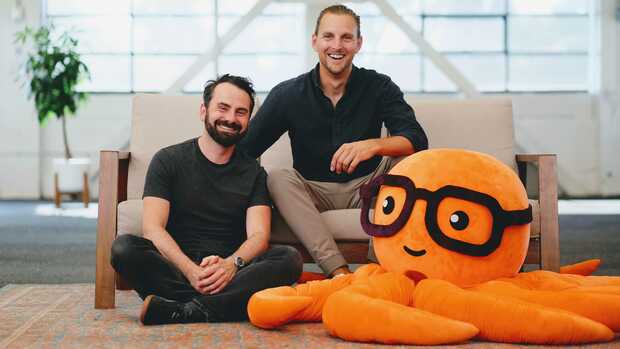San Francisco The AI-based text program ChatGPT is banned in many schools and universities. Some even fear that artificial intelligence could be used primarily to cheat on homework and exams.
OpenAI founder Sam Altman has a completely different opinion: The potential for schools and education is particularly great, says the entrepreneur, whose company with ChatGPT has reignited the hype around artificial intelligence.
Start-ups in particular want to use the new technology to make learning easier. Christian Byza founded the start-up Learn.xyz in San Francisco. At Learn.xyz, users can type in almost any topic and the system will generate a suitable training unit. Texts, images and exercises are created by AI systems.
“To avoid errors, several AI systems check each other,” says founder Byza, who previously worked for the career network LinkedIn. People check the learning units created. The start-up receives texts from the AI systems of OpenAI and the Facebook group Meta. Images come from the Openjourney system. “Learning shouldn’t be boring. We want to improve general knowledge while having fun,” says Byza.
Byza and his team recently raised three million dollars from investors for their project. In the medium term, the company also wants to offer teaching content for companies that want to train employees. The system is able to use and convey specific company content.
Worldwide, it is primarily younger users who use ChatGPT. According to a global survey by Enterprise Apps Today, more than a third of users are aged 25 to 34. In addition, only around a third of users are female, while two thirds are male.
ChatGPT causes education company Chegg to crash
Students were among the first to recognize the benefits of AI text robots like ChatGPT. With the help of AI tools, homework can be completed in seconds. Teachers are increasingly doubting whether tasks are still being completed by students or by AI assistants. The New York School District, the largest public school district in the United States, has banned ChatGPT on all devices and blocked access from schools.
>> Also read: Elon Musk: “The future of AI should not be controlled by Larry”
Many companies are also unsettled. The education company Chegg from California offers, among other things, homework help. CEO Dan Rosensweig admitted to analysts in May that user numbers have recently declined because more and more students prefer to use ChatGPT rather than Chegg’s paid service.
As a result, Chegg’s market value halved and has barely recovered to this day. At the height of the corona pandemic, Chegg’s shares were worth more than $100. Most recently they were around ten dollars.
AI start-up Synaptiq wants to train doctors
Artificial intelligence could help impart knowledge, say experts. The technology has the potential to bring high-quality education to almost everyone in the world, said Daniel Schwartz, professor of educational technology at Stanford University in Palo Alto.
Ryan Phelps can confirm this from his own experience. He used artificial intelligence to prepare for his medical entrance exam at the University of California in San Francisco. “I graduated at the top of my class,” Phelps said. He now wants to make his system available to other doctors and has founded the start-up Synaptiq for this purpose.
Books as a basis for learning are often outdated today. “Artificial intelligence can specifically identify and fill knowledge gaps,” says Phelps. He and his co-founders are supported by the renowned start-up company Y Combinator.
App Studdy: Photo of math problem provides solution
The start-up Studdy helps students solve math problems. So far the app is only available for smartphones. Users can take photos of the math problem. The AI system analyzes the task and explains the solution step by step.
“Our app has only been available for four weeks, but we have already created 34,000 learning units,” says founder Michael Lam. The team is still concentrating on math problems. The goal, however, is to make Studdy an AI assistant that accompanies students throughout their entire school years.
“We will offer everything – from homework to exam preparation to preparation for university studies,” says Lam. Like Synaptiq, Studdy is also supported by Y Combinator.
>> Also read: Tell me, ChatGPT, who am I? This is how AI language models are trained
The start-up Flint, on the other hand, wants to improve data protection using AI. The company wants to provide access to the text robot ChatGPT, where all data is secure. OpenAI, the company behind ChatGPT, uses input data to train its algorithms. The portal is therefore hardly usable for students without revealing personal data, says Flint founder Sohan Choudhury. His start-up intervenes.
Choudhury’s offering is aimed at schools. They should have access to OpenAI’s most powerful AI models, but have full control over what their students do. Data is so secure. The start-up’s first partners include private schools from US states such as Hawaii, Pennsylvania and Georgia.
More: How the chatbot is revolutionizing schools
